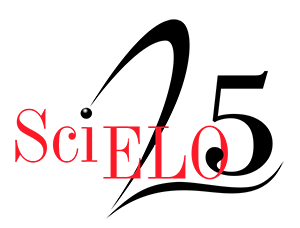
Close

The celebration of the 25th Anniversary of the SciELO Program in 2023 is held as a global forum and celebration in favor of research communication in the open science modus operandi in order to maximize the visibility and scientific, economic, technological, social, and cultural impact of information and scientific knowledge.
The perspective is to contribute to the democratization of open science best practices based on the following principles: (a) scientific knowledge as a global public good; (b) networking and partnerships as privileged means of exchanging experiences and promoting capacities, infrastructures and minimizing asymmetries; (c) quality as an inherent condition of the research communication flow in compliance with standards, best practices, and innovations; (d) findable, accessible, interoperable and reusable processes and content (FAIR principles); and, (e) diversity, equity, inclusion, and accessibility (DEIA principles) in instances, environments, and processes. It is envisioned as a global flow of scientific information that is inclusive and geographically, thematically, and culturally diverse. In particular, promoting recognition of the relevance of nationally published journals and the research they communicate with emphasis on national collections of quality journals operated by the SciELO Network in seventeen countries.
In addition to the journals, publishing institutions, research agencies that operate the SciELO Network, the organization of SciELO 25 Years calls to the proactive cooperation of organizations, movements, and leaders from all over the world that promote and operate policies, programs, products, research services, methodologies, and technologies and their communication with analyses, proposals, and recommendations that contribute to the strengthening of infrastructures and capacities for implantation and operation of research communication objects in open access.
To this end, SciELO proposes that organizations, movements, and leaderships conduct face-to-face and online seminars and working groups that analyze critical themes aiming at proposals and recommendations for the advancement of research communication in open science and more specifically to the improvement of the SciELO Program. The seminars will be held between March and July 2023. As a starting point, SciELO proposes the following topics:
— Learning Society
— Open Science Modus Operandi of Research Communication
— Diversity, Equity, Inclusion, and Accessibility of Research Communication
— Relevance of Nationally Published Quality Journals
— Relevance of Academic Books
— Technological Innovations in Research Communication
— Financial Sustainability of Open Science Research Communication
10. Learning Society
— 10.1 Scholarly Communication and Sustainable Development Goals (SDGs)
— 10.2 Scientific Dissemination
— 10.3 Social Networks
— 10.4 Value of Scientific Information
20. Open Science Modus Operandi of Research Communication
— 20.1 Open Science and the journals: best practices, challenges, resistance, advantages, research visibility
— 20.2 Preprints: national and international state of the art
— 20.3 Preprints and the journals: positive experiences and challenges
— 20.4 SciELO Preprints
— 20.5 Research Data: national and international state of the art
— 20.6 Research Data and journals: positive experiences and challenges
— 20.7 SciELO Data
— 20.8 Informed Peer Review: national and international state of the art
— 20.9 Informed Peer Review and journals: positive experiences and challenges
30. Diversity, Equity, Inclusion, and Accessibility in Research Communication
— 30.1 DEIA Principles: state of the art
— 30.2 DEIA Principles and the journals: positive experiences and challenges
40. Relevance of Nationally Published Quality Journals
— 40.1 National Policies to support nationally edited journals with a focus on SciELO. National seminars organized by the SciELO Network Secretariat and national coordinators
— 40.2 National Policies to support nationally edited journals. Representatives of countries of the SciELO Network – 10 minutes per country. Summary of the scientific output of each country will be informed in advance by a document
— 40.3 Journals: Editorial Policies, Best Practices, Positive Experiences, Challenges – Seminars structured by major thematic areas: 8 seminars. Each journal will have 10 minutes
— 40.4 Indexing. Distribution of indexing evolution per country, thematic area, and journal
— 40.5 Performance by citations per country, thematic area, and journal
— 40.6 Performance by accesses per country, thematic area, and journal
— 40.7 Social Networks and journals – state of the art and perspectives
— 40.8 Performance in Social Networks per country, thematic area, and journal
50. Relevance of Academic Books
— 50.1 National and Institutional Policies to Support Digital Books with a Focus on Open Access
— 50.2 University Publishers: Editorial Policies, Best Practices, Positive Experiences, Challenges
— 50.3 SciELO Books
— 50.4 Social Networks and publishers – State of the art and perspectives
60. Technological Innovations in Scholarly Communication
— 60.1 Research Communication Flow. Technological Solutions for Information Storage, Preservation, Security, Processing, Recovery, and Dissemination
— 60.2 AI in scholarly communication
— 60.3 Blockchain in scholarly communication
— 60.4 Metaverse in scholarly communication
70. Financial Sustainability of Open Science Research Communication
— 70.1 How much does a journal cost?
— 70.2 APC and Diamond journals
— 70.3 Market Place
Webinars were planned as follows:
1. A maximum of three hours, in the morning or afternoon. When more than three hours are required, the webinars will be split in part 1, part 2, etc.
2. Three different webinar formats are considered:
(a) One or more panels with a chair and speakers with similar times, and questions;
(b) One or more key conferences and commentators and questions with one or more chairs;
(c) One or more key conferences and questions with one or more chairs.
3. A dedicated webpage will follow up the development of the webinar. The SciELO 25 Years website will host the webinars pages, which are expected to be formatted as:
(a) Title
(b) Short and attractive description that will be used to publicize the webinar
(c) Whenever possible, a detailed description
(d) The agenda with title of presentations, speakers’ name and short CVs
(e) Interaction options
4. A registration will be required
5. A guide for conducting the event will be shared with the chairs and speakers.